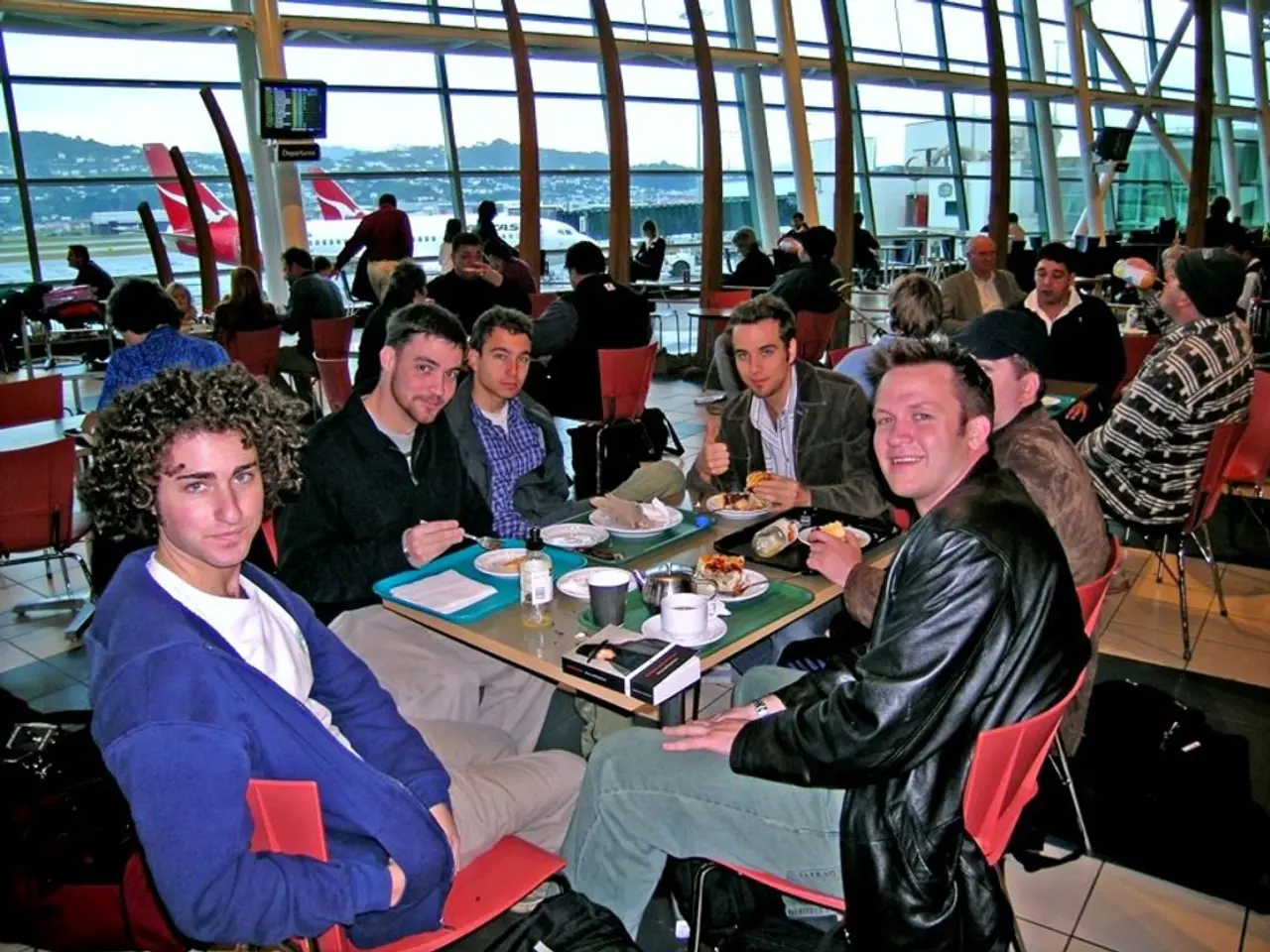Strategies for Maintaining Wellness During Journeys: Advice on Diet and Physical Activity
Embarking on a trip can be an exciting adventure, but it's essential to ensure that your health and well-being remain a priority. Here are some practical tips to help you prepare your body for travel, maintain a balanced diet, and stay active during your journey.
To begin with, preparing your body for travel involves getting plenty of rest, staying hydrated, and eating nutrient-rich meals before your trip. Exercise to boost your immunity, and pack vitamins or supplements if needed. It's also advisable to stretch before long flights and avoid heavy meals before traveling.
When it comes to maintaining a balanced diet while traveling, planning ahead is key. Start your day with a protein and fiber-rich breakfast such as whole-grain cereal, nuts, seeds, yogurt, or oatmeal. These foods can be easily prepared even in a hotel room. To avoid unhealthy temptations during trips, plan ahead by packing healthy snacks like nuts, protein bars, dried fruits, or trail mix.
Choosing nutritious foods is crucial when eating out. Opt for fresh fruits, vegetables, and lean proteins, and prefer grilled or steamed foods over fried options. Stay hydrated by carrying a refillable water bottle and limiting sugary drinks. Taking advantage of local supermarkets or markets to shop for fresh, healthy foods can also be beneficial, especially if your accommodations offer kitchen access to prepare balanced meals.
Incorporating travel-friendly workouts is another essential aspect of maintaining fitness during travel. Bodyweight exercises like push-ups, squats, planks, and lunges require no equipment and can be done in small spaces like hotel rooms. Creating a circuit routine with exercises done for set reps or timed intervals can target multiple muscle groups for a full-body workout.
If you anticipate indulging in more calories, plan to exercise harder or more frequently to balance energy intake and expenditure. Schedule workouts as you would important appointments to ensure consistency despite a disrupted routine, and be flexible if outdoor activities or fitness classes aren’t available.
By prioritizing nutrient-dense foods, staying hydrated, and employing simple, adaptable exercise routines, you can effectively maintain a balanced diet and fitness during travel while minimizing stress and maximizing your health.
Other tips for a healthy trip include embracing walking, limiting sugary and processed foods, using hotel gyms, and researching local grocery stores, hotels with gyms or swimming pools, parks, walking trails, or nearby fitness studios.
Staying hydrated is also crucial while traveling. Bring a reusable water bottle and refill it regularly. Opt for water over sugary drinks or alcohol. Choosing balanced meals is equally important. Prioritize vegetables and lean proteins, opt for grilled, steamed, or baked dishes.
Be mindful of buffet choices, filling half your plate with vegetables, and limiting high-calorie items like pastries and fried foods. Air travel is statistically the safest mode of transportation, followed by trains. Cars and motorcycles pose higher accident risks, particularly for long-distance travel.
When traveling, food safety is paramount. Avoid foodborne illnesses by being cautious with street food and unfamiliar dishes. Eat at busy, reputable vendors, choose freshly cooked food over pre-prepared items, and wash fruits and vegetables thoroughly.
Maintaining a regular eating schedule supports digestion and energy levels. Iceland is often regarded as the safest country to travel due to its low crime rate, friendly locals, and excellent healthcare system. Other safe countries include New Zealand, Japan, Canada, and Switzerland.
Lastly, pack healthy snacks like nuts, seeds, protein bars, dried fruits, whole-grain crackers, and nut butter packets to ensure you have nutritious options available throughout your journey.
By following these tips, you can enjoy a healthy and enjoyable travel experience. Happy travels!
[1] https://www.healthline.com/nutrition/healthy-travel-tips [2] https://www.webmd.com/diet/healthy-eating-tips-for-travelers [3] https://www.ncbi.nlm.nih.gov/pmc/articles/PMC5727785/ [4] https://www.mayoclinic.org/healthy-lifestyle/fitness/in-depth/exercise/art-20048389
- To prepare your body for travel, ensure you get enough rest, stay hydrated, and eat nutrient-rich meals before your trip, exercise to boost immunity, and pack vitamins or supplements if needed. It's advisable to stretch before long flights and avoid heavy meals before traveling.
- Planning ahead is essential when maintaining a balanced diet while traveling. Start your day with a protein and fiber-rich breakfast such as whole-grain cereal, nuts, seeds, yogurt, or oatmeal. Pack healthy snacks like nuts, protein bars, dried fruits, or trail mix, and choose nutritious food options when eating out.
- While incorporating travel-friendly workouts, opt for bodyweight exercises like push-ups, squats, planks, and lunges, which require no equipment. Create a circuit routine with exercises done for set reps or timed intervals to target multiple muscle groups.
- If you anticipate indulging in more calories, plan to exercise harder or more frequently to balance energy intake and expenditure. Schedule workouts as you would important appointments to stay consistent.
- To enjoy a healthy and enjoyable travel experience, also consider embracing walking, using hotel gyms, researching local grocery stores, hotels with gyms or swimming pools, parks, walking trails, or nearby fitness studios, and staying hydrated by bringing a reusable water bottle and refilling it regularly. Mindfulness is key, especially when it comes to food safety, avoiding street food and unfamiliar dishes, and being cautious.




